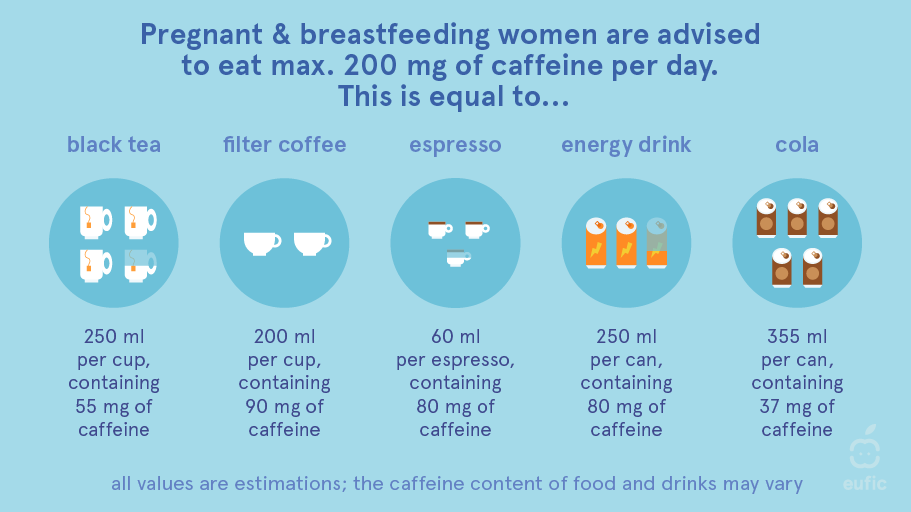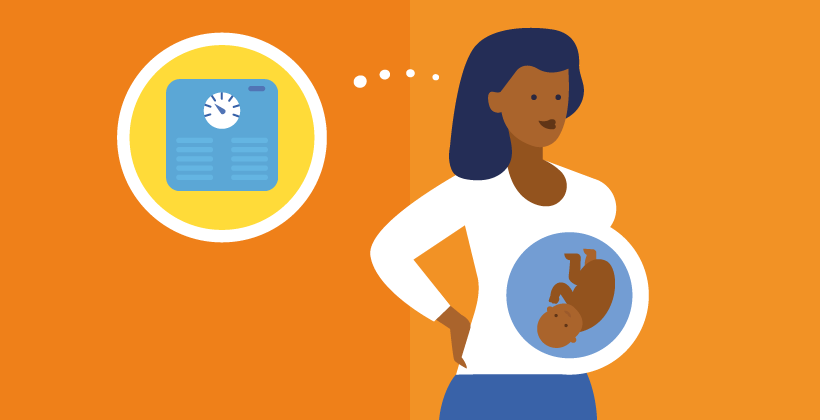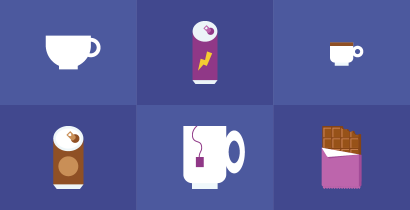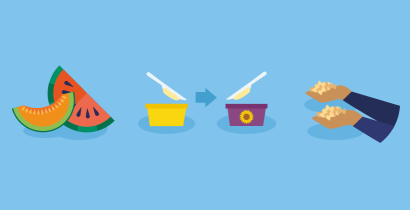Is caffeine good or bad for pregnancy and breastfeeding?
Last Updated : 31 July 2024Caffeine is a stimulant naturally present in coffee, tea, chocolate, and certain plants, while it may also be added to energy drinks, colas, and certain sports and weight loss supplements. However, if you are pregnant or breastfeeding, you might need to reduce your daily intake of your favourite drinks and foods as they contain caffeine. This article explores the question: is caffeine safe when pregnant and breastfeeding?
Is caffeine safe when pregnant?
During pregnancy, the rate at which caffeine is metabolised and cleared from the mother’s blood slows down significantly. In healthy non-pregnant adults, after an average of 4 hours the body has broken down half of the caffeine we have ingested (estimates vary between 2-10 hours). However, at the end of pregnancy, caffeine breakdown can take as much as 3-4 times longer compared to non-pregnant women. This is because the activity of the enzyme, CYP1A2, is inhibited due to the interaction of caffeine with oestrogens and progestogens. Caffeine can pass through the placenta and thus reach the unborn child. As the unborn child cannot break caffeine down yet, they are most vulnerable to the negative effects of caffeine.1
There is a dose-dependent association between caffeine intakes during pregnancy and the risk of adverse birth weight-related outcomes. Meaning that the risk of unfavourable health effects rises in a linear manner as caffeine intakes increase. The association between caffeine intakes and other adverse pregnancy-related outcomes is less consistent. The European Food Safety Authority (EFSA) concludes that regular caffeine consumption of up to 200 mg per day are safe for the unborn child. The vast majority of the population has intakes below this limit.1
Is caffeine safe when breastfeeding?
If a breastfeeding woman ingests caffeine, a small amount of it will end up in breastmilk. At a high intake of 3 mg of caffeine per kg of body weight per day or more, it can increase the heart rate in the baby and jitteriness. EFSA concluded that no adverse health effects for the baby are to be expected if the mother limits the intake of caffeine to 200 mg at one time or spread throughout the day. At that amount, the baby gets no more than 0.3 mg of caffeine per kg of body weight, which is ten times lower than the lowest amount at which no adverse effects have been found in most babies.1
How much caffeine is safe during pregnancy and breastfeeding?
For pregnant and breastfeeding women, EFSA concludes that regular caffeine consumption of up to 200 mg per day are safe for the unborn child or breastfed infant. This includes any product, beverage or food containing caffeine (i.e., brewed coffee, tea, cola, caffeinated energy drinks, chocolate, caffeinated supplements). The World Health Organization recommends pregnant women with high daily caffeine intake (more than 300 mg per day) to lower their daily caffeine intake during pregnancy. This is because high caffeine intakes (more than 300 mg) are probably associated with a higher risk of pregnancy loss and low birth weight (compared to low or no caffeine intakes).2
200 mg of caffeine a day is equal to about:
- 3 ½ cups of black tea (250 ml per cup, containing 55 mg of caffeine)
- 2 cups of filter coffee (200 ml per cup, containing 90 mg of caffeine)
- 2 ½ espressos (60 ml per espresso, containing 80 mg of caffeine)
- 2 ½ cans of energy drink (250 ml per can, containing 80 mg of caffeine)
- 5 cans of cola (355 ml per can, containing 37 mg of caffeine)
The presence of caffeine has to be clearly labelled in drinks containing more than 150 mg/L according to European legislation. However, this rule only applies to some soft drinks and energy drinks containing caffeine, not to tea, coffee, and their related products.

The bottom line
Pregnant and breastfeeding women can still enjoy their favourite cup of coffee and tea. EFSA concluded that a caffeine consumption of up to 200 mg per day are safe for the unborn child or breastfed infant. This is equal to about 2 cups of coffee (200 ml per cup), 3 ½ cups of tea (250 ml per cup), 2 ½ espressos (60 ml per espresso), 2 ½ cans of energy drink (250 ml per can) or 5 cans of cola (355 ml per can).
Besides caffeine, certain foods and drinks can also increase the risk of harm to your unborn baby. Knowing which foods to avoid and choosing safe alternatives will ensure both your own and your baby’s health.



